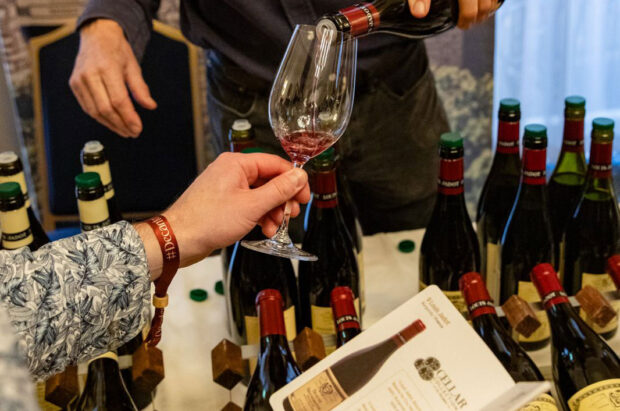Tempura is a popular Japanese dish made by frying batter-coated seafood and vegetables in light or dark-coloured sesame oil.
These deep-fried morsels, which are supposed to be enjoyed crunchy and piping hot, were introduced to Japan in the 16th century by Portuguese Christian missionaries. The name ‘tempura’ comes from the Portuguese term ‘tempêro’, which means ‘seasoning’.
Initially, it was just a hawker food in Japan but in the 19th century, speciality restaurants appeared and there are now many places to enjoy this cuisine, with its popularity also growing in Western countries.
Consider the tempura ingredients
Finding the best wine pairing for tempura starts with considering the texture of the ingredients, seasonings and frying oil used by your chosen restaurant.
Seafood and vegetables, in addition to the batter (usually made of water, flour and egg yolks), form the key components of tempura.
Prawn is the ‘king’ ingredient and is usually served as the first course of a meal. Other seafood options include squid, white fish and sea eel (anago), while green asparagus, sweet potato and shiitake mushrooms are among the most favoured vegetable ingredients for these deep-fried dishes.
Seasonings are also crucial to the way the dish is enjoyed. Authentic tempura is enjoyed with salt and lemon (or sometimes just salt) or with tentsuyu (a soy sauce-based dipping sauce).
It is also worth noting that the roasting level of sesame used for the frying oil differs by restaurant. Unroasted sesame oil makes a lighter-coloured coating while heavily-roasted oil creates a darker colour and richer, nutty flavours – another factor to take into account when pairing wines.
The diversity of Sherry
Reflecting on the origins of tempura on the Iberian Peninsula, it follows that Sherry may be a good place to start in terms of a wine pairing.
After a discovery tasting with my fellow wine experts, we found that tempura goes well with dry Sherries that have a crispy, nutty flavour and are high in alcohol. Fino, Manzanilla, Amontillado and dry Oloroso are our top choices.
With seafood tempura seasoned with salt and lemon, Fino or Manzanilla are the most suitable pairings. Deep-fried prawn served in this way goes perfectly with those two styles, especially with Manzanilla, which has a bit more saltiness than Fino due to its terroir. If you prefer pairing your tempura with tentsuyu, however, richer Amontillado is the better choice.
Green asparagus tempura served with salt matches very well with Fino. To pair with tentsuyu-seasoned sweet potato and shiitake mushroom, Amontillado and dry Oloroso are clear winners.
With the extraordinarily rich-flavoured sea eel tempura, which the chef would always recommend dipping in tentsuyu, we also prefer Amontillado or dry Oloroso.
Bubbles offer balance
Sparkling wines are natural partners for deep-fried dishes like tempura (although many Japanese foodies would prefer a cold beer).
Brut-style Old World sparklers such as Champagne, Cava and Franciacorta alongside English fizzes are obvious choices due to their higher minerality and refreshing acidity. Proseccos with a good level of freshness are also ‘why not’ options.
Blanc de Blancs is a good match for tempuras with shrimp, white fish or vegetable fillings; a richer Blanc de Noirs would be better paired with sea eel.
Still wines add dimension
While sparkling wines with their crisp bubbles neutralise the greasy texture of tempura, still wines add to the flavour and generate new dimensions to the pairing experience.
Generally speaking, the minerality of seafood tempura matches better with Old World still wines rather than those from the New World.
For salty seafood tempura, you won’t go wrong with a light to medium-bodied, unoaked, less aromatic dry white such as Muscadet. If you’d like a squeeze of lemon, a refreshing, crisp Chardonnay such as a village-level Chablis would work better.
If you enjoy your seafood tempura with tentsuyu, consider richer dry whites, such as a Burgundian oaked Chardonnay or a white from the Côtes du Rhone.
With salted green asparagus tempura, a dry, medium-bodied, slightly aromatic white such as Sancerre or Alsace Riesling matches well. If tentsuyu is your sauce of choice, consider a richer white.
Salted sweet potato and shiitake mushroom tempura tend to work well with unoaked Chardonnay whereas tentsuyu-seasoned versions prefer full-bodied whites or even a fruity red. A regional level Merlot from Bordeaux’s Right Bank or the Languedoc or a Burgundian Pinot Noir would be good choices.
To balance the richness of sea eel tempura, you will need a rich, full-bodied red with a good amount of tannin. A Syrah from the Northern Rhône or a classy Cabernet Sauvignon from Bordeaux’s Left Bank will not fail to impress.







